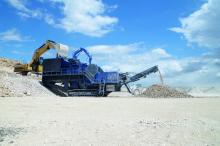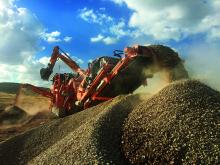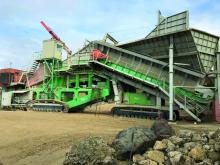An innovative OEM showcases its leading fully electric drive crushing and screening technology to customers and distributors from all over the world, while other models from leading manufacturers are proving their worth as premium aggregate processers. Guy Woodford reports.
Hosted by Keestrack’s Norway and Sweden dealer, Fredheim Maskin AS, the Demo Days included demonstrations of the Belgian global market OEM’s new fully electric drive H6e three-deck cone crusher and B4e two-deck jaw crusher. Keestrack also highlighted its fully electric drive R3e crusher for the recycling materials sector, due to be launched at
The H6e 400tonnes/hour class cone crusher is the big brother of the H4 and H4e 250tonnes/hour machines. Like the H4, the H6e can be used in primary, secondary, tertiary or quaternary crushing. Designed to crush the toughest rock and ore, the diesel/electric drive model can handle feed size up to 215mm and can be run with a Closed Side Setting (CSS) ranging from 16mm-44mm, depending on crushing chamber configuration. The H6e’s three-deck screen offers customers multiple high quality shaped product options at any one time. Crucially, the H6e is said to reduce fuel costs by up to 70% when plugged into mains. This is a significant additional cost saving to the already impressive 25% reduction in fuel costs said to be achieved with Keestrack diesel/electric cone crushers, when driven by on-board diesel engine and on-board genset, compared to comparable diesel/hydraulic machines.
Due to be available in Q2 2018, the R3e is an up to 250tonnes/hour fully electric drive impact crusher for recycling customers. Like the H6e, the model is said to reduce fuel use by up to 70% when plugged into mains. Optional with the R3e is a single deck after screen and return conveyor, equating to a 30tonne operating weight including all options.
Capable of processing up to 400tonnes/hour of material, the B4e jaw crusher can handle feed sizes up to 600mm. The model comes with an independent double deck vibrating pre-screen (2300mm x 1000mm). The primary crusher’s 5m³ intake hopper is suitable for wheeled loader and excavators. The B4e comes with a hydraulic sliding frame for service access under the feeding and scalping unit. The jaw crusher offers similar fuel consumption savings to the H6e and R3e.
Keestrack Inotech Demo Days 2017 attendees heard how all new and existing Keestrack crushers, screens and scalpers are said to offer the lowest cost per tonne, the highest performance and reliability, diesel, hybrid and ‘e’ electric drive options, load-sensing hydraulics for reduced fuel consumption, and a fully-tracked, mobile design. They are also said to be quickly operational thanks to fast, flexible set-up, with no support legs required. They also come with 24/7 monitoring capability through the Keestrack-er GPS system.
An Intoech Demo Days 2017 presentation by Michael Brookshaw, Keestrack’s global distributor manager, noted that the 650 employee-strong company was one of the two “fastest growing crushing and screening companies in the world”. Brookshaw said Keestrack is on course to achieve a €100 million turnover in 2017, having recorded an €85 million turnover in 2016.
Offering its machines in 52 countries worldwide through its global network of 70 service partners, Brookshaw stressed how Keestrack has invested heavily in its manufacturing operation in Sternberk, Czech Republic, with a 7,000m² factory extension, including a new state-of-the-art Nano coating powder painting facility, having been completed this year. A new production hall is also due to be completed in early 2018, allowing for full production of Keestrack’s comprehensive machine range. Another extension is planned at Sternberk in 2018-19. Meanwhile, Keestrack has also upgraded its manufacturing site in Chuzhou, China, – giving it an even stronger base from which to expand the OEM’s offer to Asian customers.
Speaking about Keestrack’s growth this year and prospects for further growth in 2018, Kees Hoogendoorn, president of Keestrack Group, said: “We’ve grown by 20% to date this year. Many markets have picked up. Spain, for instance, was very quiet, as was Russia for many years, but the financial crisis has been put behind us. Banks are financing easier again. There’s more confidence in the markets, and more infrastructure going on. The World Bank has put out a report saying that they see this trend continuing to 2022. It’s a very prosperous time ahead, and next year we are targeting another 20% growth globally.”
Hoogendoorn also gave an insight into his passionate belief in a future all-electric drive global crushing and screening plant market. “There is a trend globally for a better environment. Many cities are forbidding the driving of diesel cars and are pushing on with pollution reduction. It’s a major topic in all big cities. Around 60% of Norway car sales are electric cars, although this is currently subsidised. The cost of ownership of an electric car or an electric crusher is less than a diesel hydraulic model. There are fewer running components and electric machines have much more simple technology. People think they are more complex but they are not. An electric motor has been existing for 150 years but it is extremely simple. It’s just a magnetic field making a shaft turn.”
Headquartered in Spydeberg, Norway, around 45 kilometres southeast of Oslo, and co-owned by brothers Per and Svein Fredheim, Fredheim Maskin AS has been Keestrack’s distributor in Norway since late 2005, and in Sweden since 2009. The company’s impressive growth in the past 12 years led to it posting a €33 million turnover in 2016.
Asked why Fredheim Maskin AS became a Keestrack distributor, Per Olav Fredheim said: “I noticed the Keestrack models at
Per Olav Fredheim says Keestrack scalpers were initially very popular among customers, filling a then gap in the Norwegian market for such plants. Now, around 70% of Fredheim Maskin’s business concerns Keestrack’s complete model range. “Our customers like the reduced fuel consumption of the Keestrack machines and that they are easy to service,” he adds.
Given the abrasive nature of much Norwegian rock, Fredheim Maskin AS and its customers have also acted like an R&D department for Keestrack, as Kees Hoogendoorn notes: “The best testing ground in the world is in Norway. If our machines work here, they will work everywhere.”
Natural stone processing often requires individual solutions to guarantee the ideal preparation of special stone. At bauma 2016, with its MOBICAT MC 125 RR
SMBP has been preparing limestone for concrete production since 1978 in the Centre-Val de Loire region. A new project for processing limestone made the acquisition of a new crushing plant necessary. Regular relocation of the plant according to mining progress led to the decision for a mobile solution. SMBP has already used a special plant from Kleemann for limestone processing: the MOBICAT MC 162 PRR. In the last 15 years, the jaw crusher plant has processed 25 million tonnes of material.
“The MC 162 PRR is perfectly tailored to my application and I am very satisfied with its output,“ stated Christian Laye, general director of SMBP. “This is why I contacted Kleemann to have another mobile special plant developed.”
The adhesive limestone makes particularly thorough prescreening necessary. The MC 125 RR was therefore equipped with a two-stage wobbler feeder.
Since July 2016, SMBP has been using the 160 tonne MC 125 RR in the first crushing stage. The limestone is fed with a size of 0 - 900 mm to the elliptical rollers in the first stage of the wobbler feeder. At the same time, contamination and dust are removed from the stones. The material is levelled and then conveyed to the second stage of the wobbler feeder for further cleaning and better material distribution. The fines with a size of 0-80 mm fall through the rollers onto a conveyor belt and leave the process via the side discharge conveyor. Jaw crusher wear is thus reduced and a total output of 600tonnes/hour is achieved. The oversize grain is crushed to 0-300mm and then further processed by a stationary plant for concrete production.
The total area of the quarry in which the MC 125 RR is used is around 250 hectares. The company anticipates that 1.6 million tonnes of limestone will be processed in this area in the years ahead. A stationary plant is to be used for processing as of 2018. A mobile crushing plant will therefore be used initially to develop the quarry until space has been created for a stationary plant. The MC 125 RR will then be used by SMBP in another quarry.
A
Mehmet Bastas is the owner of a very successful Turkish road construction company based in Mardin, an ancient city about 20km north of the border with Syria and also close to Turkey’s border with Iraq. The beautiful centre, as well as the sights in the province of Mardin, is known for its historical and cultural wealth, spared from any attacks or devastation.
The ruins of Dara-Anastasiopolis, an East Roman fortress city, are still a symbol of the importance of this area in late antiquity. The Deyrulzafaran monastery Zafaran is another historical attraction of Mardin and originates from as early as 2000 BC.
“The cultural and religious diversity in this area did really impress me. Thanks to our new customer, Mehmet Bastas, I gained an insight into this multi-religious part of Turkey. The co-existence is perfectly easy and the success of the company Bastaslar also shows that the economy is doing well, especially in regenerating and extending the infrastructure,” says Wolfgang Kormann, CEO of Rockster, who visited the company’s new customer in Mardin.
Although Rockster’s long-standing Turkish dealer, Alfamobil, has already sold many Rockster plants in Turkey, no Rockster crusher has worked in this area of Mesopotamia so far. Mehmet Bastas, owner of Bastaslar Insaat Ltd, discovered Rockster through Alfamobil and rented an R1100 impact crusher for his limestone quarry. After a month he was fully convinced of the machine’s capabilities, so he ordered a new R1100DS this summer. “The compactness and the simple transport have really impressed me. My operators like the easy handling of the new crusher and the quick set-up; the machine is put into operation within 10 minutes. Moreover, the overload protection of the crushing chamber is a very useful system, thus to avoid blockages and to improve the material flow,” explains Mehmet Bastas, who has many years of experience with mobile crushing systems.
In the limestone quarry of Bastaslar, Rockster’s R1100DS has been working since the beginning of September. Equipped with the screen box RS104 and the double-functional return/stockpile belt RB95 the machine crushes limestone with edge lengths of up to 700mm to 0-35mm final grain. Bastas is satisfied: “With a daily output of approximately 2,000 tonnes, our daily needs are easily covered. We regularly use the pre-screening system in order to remove the sandy part and receive a very high-quality cubic final grain in one pass and thus the best base material for our road construction projects.”







